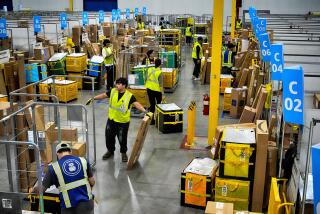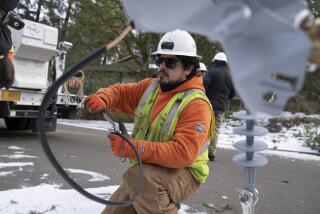Inflation Tame, Economy Strong, Greenspan Says
WASHINGTON — Federal Reserve Chairman Alan Greenspan, finding “no evidence of any upturn in inflation,” Tuesday predicted another year of solid economic growth, although at a somewhat slower pace than in 1998.
With unemployment at its lowest level in a generation, price increases negligible and the stock market booming, Greenspan offered no indication that the Fed will soon adjust interest rates either up or down.
But the policy of watchful waiting could change quickly if the economy turns sour, Greenspan told the Senate Banking Committee. “Monetary policy must be ready to move quickly in either direction should we perceive imbalances and distortions developing that could undermine the economic expansion,” he said.
Greenspan, increasingly lauded as the architect of the 1990s boom, received a hero’s welcome from the committee. Chairman Phil Gramm (R-Texas), while crediting the resourcefulness and energy of the American people as primarily responsible for today’s prosperity, added:
“If there is any person currently in a public-policy position that is due at least partial credit for the current state of the American economy, that person is sitting in front of us today.”
Greenspan himself characterized the economy as “surprisingly robust in recent years.” Strong and fast “increases in capital spending, productivity, real wages and asset prices have combined to boost economic growth far more and far longer than many of us would have anticipated,” he said in his semiannual economic report to Congress.
Increased investment in equipment and factories is boosting productivity and “helping to keep inflation well-behaved,” Greenspan noted. At the same time, new technologies and the optimism of both consumers and investors are keeping spending strong and stock prices high.
Consumer spending, the driving force behind 1998’s strong economy, figures to keep chugging along through a good part of 1999. The Conference Board, a business research group, reported Tuesday that its index of consumer confidence rose in February for the fourth straight month.
Greenspan sounded less concerned about soaring stock prices than he did in late 1996, when the Dow Jones industrial average stood at about 6,500. Then, he questioned whether investors had fallen prey to “irrational exuberance.”
On Tuesday, with the Dow nearly 50% higher, he said only that “equity prices are high enough to raise questions about whether shares are overvalued.” Stock prices were mixed Tuesday, with the Dow declining 8.26 points to close at 9,544.42.
The “fundamental underpinnings of the recent U.S. economic performance are strong,” Greenspan told the committee. The nation’s output of goods and services--gross domestic product-- soared at an annualized rate of 5.5% during 1998’s fourth quarter.
“Although some slowing from this torrid pace is most likely in the first quarter,” Greenspan said, “labor markets remain exceptionally tight and the economy evidently retains a great deal of underlying momentum despite the global economic problems and the still-visible remnants of the earlier financial turmoil in the United States. . . .
“Our economy’s performance should remain solid this year, though likely with a slower pace of economic expansion and a slightly higher rate of overall inflation than last year.”
Consumer prices have been rising at an annual rate of only 1.7%, surprising economists who expected the low unemployment rate to bring pressures for increased wages, and then prices. Instead, Greenspan said, the economy “has become less inflation-prone than in the past.”
The Fed chairman added that businesses are showing surprising restraint on the price side. “Firms have evidently concluded that if they try to increase their prices, their competitors will not follow, and they will lose market share and profits,” he said.
Greenspan’s most sober comments focused on the uncertain economic situation abroad. In Thailand and South Korea, both mired in deep recessions, “early signs of stabilization and economic recovery have appeared,” he said.
In Brazil, by contrast, confidence has waned because of high interest rates, substantial debt and a dwindling of foreign currency reserves that triggered a devaluation. “Brazilian authorities must walk a very narrow, difficult path of restoring confidence and keeping inflation contained with monetary policy while dealing with serious fiscal imbalances,” Greenspan said.
The good news about Brazil, he added, is that “there has been limited contagion to other countries” in Latin America.
* MIXED DAY: Bond yields jumped while stocks struggled coming off Monday’s rally. C4
More to Read
Inside the business of entertainment
The Wide Shot brings you news, analysis and insights on everything from streaming wars to production — and what it all means for the future.
You may occasionally receive promotional content from the Los Angeles Times.










